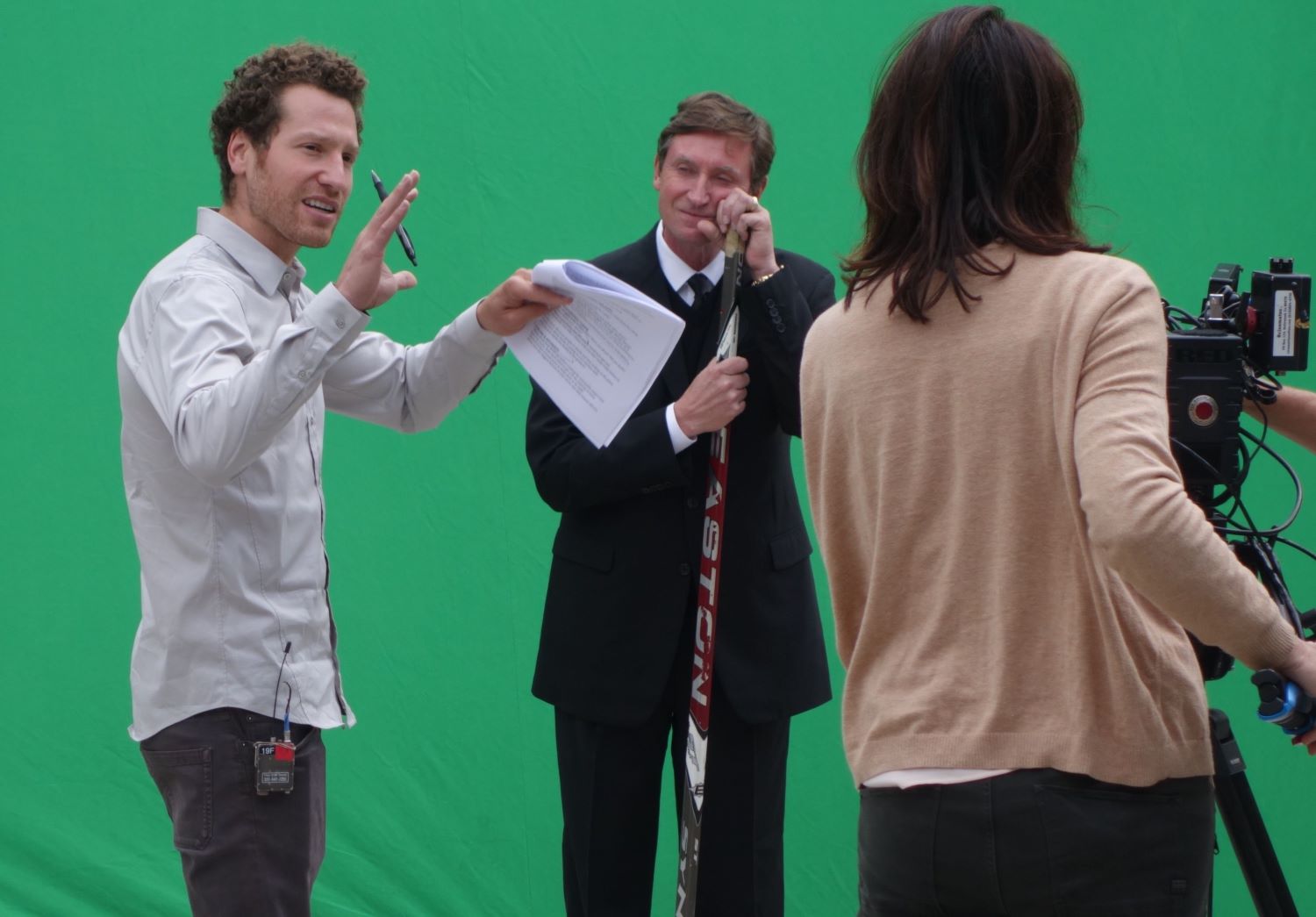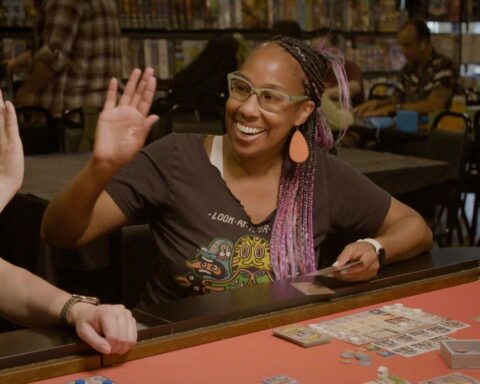Wayne Gretzky earned the nickname “The Great One” while playing for teams like the Edmonton Oilers and the Los Angeles Kings, but the moniker is not just about the number of goals he scored during his career. “The Great One” reflects Gretzky’s approach to the game, his artistry, and his intuition on the ice. He’s one of few people who can honestly claim to be the best in his profession.
Gretzky receives fair credit as hockey’s MVP in the documentary In Search of Greatness. Director Gabe Polsky, who previously delivered the acclaimed hockey doc Red Army, puts Gretzky’s eye for greatness in conversation with athletes such as football champ Jerry Rice and soccer star Pelé. These icons appear in interviews conducted by Polsky, while archival footage and experts illuminate the characters of tennis pro Serena Williams and basketball all-star Michael Jordan, among other notable figures. The film inspires audiences to reach for the impossible by seeing greatness as something that is achieved not by relentless routines and regimen, but by the power of creative thinking.
Polsky’s doc offers an inspirational and empowering message for audiences because it doesn’t position greatness as some innate or divine endowment. The stories of these athletes are all rooted in pure love of the game, of finding one’s passion and honing one skills through a genuine desire to be the best. Some people have this drive, while others simply don’t. The doc offers a fine companion piece to this year’s rock climbing adventure Free Solo as it follows the athletes’ quest to reach the peaks of their professions by overcoming the odds and persevering in a culture that often encourages conformity at the expense of creativity. The film is an anthem for outsiders and for people who forge their own paths for success. (Read more on Free Solo and the pursuit of greatness here.)
Sports might be the starting point for the conversation during In Search of Greatness, but the implications of the documentary translate to virtually any field. By having the best of the best reflect upon their roads to glory, the doc asks how one defines success in one’s respective field and how one achieves that goal. Every Wayne Gretzky in hockey finds a Meryl Streep in acting, every Pelé in soccer has an Alice Munro in literature, and for every Jerry Rice in football, there’s a John Williams in composing.
Speaking with POV by phone ahead of the film’s theatrical release on November 9, Polsky relates the creative approach of athletes like Gretzky to his own path to becoming a filmmaker. He finds that the notable voices who stand the test of time are most often the iconoclasts and innovators. It’s a great lesson for anyone embarking upon the pursuit of greatness.
POV: Pat Mullen
GP: Gabe Polsky
This interview has been edited for brevity and clarity.
POV: I understand you played hockey in high school and university. What was your style of practice?
GP: While growing up, I learned on an outdoor rink and spent a lot of time just playing around and practicing moves. I really liked to be creative. I was more offensive-minded. I liked players like [Mario] Lemieux, Dennis Savard, Wayne Gretzky— guys who were doing interesting things on the ice. When they had the puck, they were doing things that I’d never seen before and I wanted to do the same. I liked making interesting plays happen and being unpredictable. It’s hard to defend against unpredictability. That’s the whole point of sport, really, to fool your opponent.
POV: A lot of the film translates beyond sports.
GP: I channeled the same creativity that I had in sports and knew in my heart over towards filmmaking. It’s the same creative energy. It’s just a different form. I applied the same principles from playing hockey to my own filmmaking. I don’t like when films are predictable, I don’t like when you feel like you’ve already seen that style or idea before. I’m always trying to surprise people and bring something new to the table. Otherwise, they’re just seeing the same thing over and over again.
POV: What was your working definition of “greatness” going into the film?
GP: The idea, very generally, is that greatness is creativity. When we go to the stadium, we want to see greatness, but what is that? It’s a kind magic and an expression that is powerful. It moves us because [the greatest athletes] are either so beautiful or original or genius in a way. You start from there and then go backwards [from a filmmaking perspective]. How do you develop that? I was trying to show people who redefined how we understand sport, but not just sport.
POV: I understand that you met Gretzky at the TIFF premiere for Red Army. Was that the starting point for the film?
GP: One of my colleagues had a father who was on soap operas and apparently Gretzky watched a lot of soaps. That’s how they became friendly. This guy was an actor, and was involved with Red Army, and he told Wayne about the premier. Wayne found time and showed up with his entire family. I was so nervous and happy. Afterwards, he was backstage at Ryerson and we were talking for five or ten minutes. That was the first time I met him. When reaching out to him later, I already had this idea [for In Search of Greatness], but now he was familiar with who I was and he was familiar with my work. Obviously, meeting him helped getting him, but it wasn’t easy even to get him for this film. It took about six or seven months just to get through. The other guys were even longer!
POV: So how’d you choose whom to have in the film? How do you decide not to move on to, say, the second greatest player if someone was unavailable?
GP: I absolutely stuck to the rule that it had to be the greatest of all time in each respective sport. For football, obviously there are different positions so you can argue. If you don’t stick to the principle, then you downgrade the film. Nothing to take away from other athletes, but that was the rule—from the eyes of the greatest of all time. If there’s someone who is not the greatest, then I can’t say that anymore. I did go after, obviously, Michael Jordan and Serena Williams. You get the essence of Michael Jordan and Serena Williams by integrating different people to keep it fresh and dynamic. It would’ve been great to get someone like Muhammad Ali, if he were alive and coherent, because he embodies greatness.
POV: Can you talk about the approach of working around the absent stars?
GP: Every filmmaker knows that you can’t get everything you want and then you start to see that there’s a silver lining. For me, this film was an exercise in limitations because I only got on average an hour to an hour and twenty minutes with each athlete. I had incredibly little to work with, but I’m really proud of what we were able to do with so little time with these guys. You see a lot of people bragging about how much footage they had and how hard it was to go through all the footage – I’ve done something like that before, but in certain ways, it almost better to have less because you save money and you’re more focused.
POV: Did that present a challenge with the archival? There are so many clips and highlight reels available from the games the stars played.
GP: Obviously I had to support a lot of this with archival. That was an interesting exercise was often difficult because I didn’t have a structure going in. I’m telling you about the nature of greatness. How do I tell a story like that and with such little footage? How do I do it in an interesting way that’s cohesive and not just chapters on each person, but has a flow and lets audiences connect?
POV: I like how the title cards offer quotations from philosopher Alan Watts. What inspired this approach in terms of structuring the film thematically?
GP: I started reading a lot about Daoism and Buddhism when I was 16 or 17 years old. I’m not a Buddhist or anything, but I really appreciated that philosophy and I came across Alan Watts. I thought that he was really effective at communicating those ideas in layman’s terms. Those ideas are so wise and relevant. As the film evolved, I realized that his work could serve as transitions and allow the film to breathe. They also put in people’s minds something to think about from section to section.
POV: You mentioned the archival footage, which I thought worked in terms of including Serena Williams, Muhammad Ali, and Rocky Marciano. The clip that I really liked was the one of Michael Jordan giving his speech at Hall of Fame when he talked about all the setbacks and rejections that motivated him to push harder. Have you had a particular moment in your career that you inspired you to up your game?
GP: Absolutely. People who don’t believe in you or your work, or people who don’t support you, can have more of an impact than people who do support you. [Rejection] can be so painful and difficult that it just pushes you incredibly hard to succeed. Anger can transform into creativity, greatness, and beauty. I think his speech is incredibly relatable. I try and be positive about it too. I try not to be fueled but negativity, which, of course, can always transform into something positive. It can be daunting and painful and confusing.
POV: Do you read reviews of your own work?
GP: I do read reviews. I obviously take everything with a grain of salt, but I like to know how my work is affecting people. I’m not doing this work in a vacuum. The point of movies to share them with the world and if you don’t know what people are saying, thinking, or feeling after [seeing] your work, then I don’t understand what you’re doing. It’s like you’re playing hockey. There are thousands of people watching you. Don’t you want to know what your work is doing? Maybe sometimes you know your work is ahead of its time or maybe sometimes it’s just not resonating with certain people. You learn a lesson.
POV: Looking beyond sports, if you were to say cast this movie about filmmaking, music, or politics, who might be the equals of Wayne Gretzky, Jerry Rice, and Pelé?
GP: For filmmaking, has there ever been a successful film that’s been controlled by a studio where they gave all these notes and the filmmaker didn’t have a vision? It’s hard for me to come up with a single movie that the studio had its hand around and was a great success.
POV: And that would depend on the definition of “success,” too.
GP: It also means whether it can stand the test of time. Maybe that’s the test for greatness in movies. As far as filmmakers go, Herzog is on one end of the spectrum. There’s also Richard Linklater, who didn’t go to “film school” and showed that you don’t really need to if you have a voice and can do different, incredibly creative things. There’s the Scorseses, who brought something new, just like Kubrick and Paul Thomas Anderson, and then obviously Steven Spielberg. The common thread is that when they came into the game they brought something new to the table. They brought their own voice, their own style like Gretzky and that’s why we love them.
POV: How does doping affect our idea of greatness? Look at someone like Lance Armstrong. Had this film come out 10 years ago, he might’ve been in it.
GP: Doping doesn’t make sports more interesting. In the film, Gretzky says at the end of the film that the players today are bigger, faster, and stronger, but that doesn’t make them smarter. It’s just the same with movies. If movies have more financial muscle behind them, does that make them better? The interesting things are coming out of the independent side. Doping has nothing to do with creativity.
POV: What about greatness in political leaders?
GP: Politics is a similar principle. There are people who shake up the game and then there are people that are just vanilla, doing the same exact thing. Look at John F. Kennedy, who came in as a younger guy and started doing things differently. We revere him. Then there are guys who are just status quo, like George Bush.
POV: It’s funny how much the story of greatness resonates with in today’s political climate because we have someone like Trump who plays by a different rule book.
GP: Trump is very interesting. He’s shaking up the game and his whole thing is ridiculous. The problem is he’s too destructive about it. The fact is, why is the media paying attention to Trump? It’s because he’s entertaining. Entertainment entails being creative and doing something different. That doesn’t mean he’s a good guy or whatever, it just means that people are spending money because he’s putting on some kind of a show. Maybe politics should be more boring.
He shoots, he scores!
In Search of Greatness opens in theatres Nov. 9.












